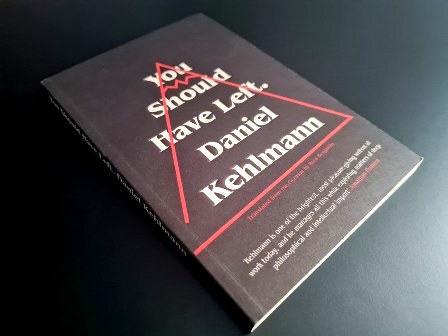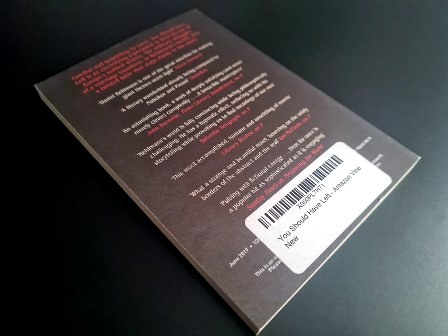
The story was translated from German by Ross Benjamin.
DLS Synopsis:
He was under pressure to get the screenplay for ‘Besties 2’ done. Get it written and over to Schmidt. It had come to the point where he knew he needed somewhere he could go so he could concentrate on the screenplay. Somewhere away from distractions where he could just get on with writing the damn thing.
So he’d rented out a house on Airbnb. One that was up in the mountains of Germany, surrounded by woodland and overlooked by two vast glaciers. It was the perfect spot to get away from it all. An isolated and tranquil setting, where his only distractions would be Susanna his wife, and their four-year-old daughter Esther.
Although, besides the stress and pressure of having to get the screenplay written, he can also feel his marriage is struggling too. His wife, a failing actress, is always scornfully reproaching his work. Dismissing it as lowbrow entertainment with little more merit than that. But to him at least it pays the bills. It covers the mortgage for the plush town house they purchased, thanks to the moderate success of ‘Besties’.
Nevertheless, despite their differences and the constant arguments, he still loves her. He knows he wouldn’t want to be without her. And he’s sure she wouldn’t want to be without him. If only they didn’t get on each other’s nerves so much. If only they didn’t fight all the time.
However, the isolation of the mountainside house has its downside. With little else to do in the property, nerves start to flare. Whether it’s the pressure or the claustrophobia of the locale, or something else – it’s starting to affect the screenwriters work. He can’t think straight. He’s sure he’s seeing things. Stuff that doesn’t make sense. Reflections. People.
All the time he’s jotting everything down in his notebook. Trying to make sense of it all. Trying to leave a record. Just in case something happens to them. Just in case…
DLS Review:
Daniel Kehlmann isn’t exactly the sort of author you would usually associate with horror. Indeed, his work isn’t genre-specific per se. Yes it’s dark, and incorporates some troubling and sometimes harrowing moments. But it nevertheless doesn’t fit snuggling into a genre-specific camp.
Kehlmann’s short novella ‘You Should Have Left’ is exactly this. It’s dark and bleak and mixes in notions of questionable slipping sanity, as well as ghostly presences, possibly brought about by distortions in time, space and reality. It’s a sort of ‘Donnie Darko’ (2001) style of horror. The type of read that some might refer to as ‘a thinking man’s horror’, should they be pretentious enough to splurt out such monstrously smug tripe.
At the core of the novella is a struggling marriage, accompanied by our screenwriter’s attempt at opening his eyes to where he is in life. Here, Kehlmann’s novella appears to chisel out a clumsy metaphor about “being more involved with your family life, and not letting it all pass you by” whilst it wobbles around a handful of other possible ideas – many of which remain only vaguely suggested at.
There’s a lot of emotional strain and burning anguish saturating the pages. In fact, the vast majority of the tale - even when it wanders off onto one of the scenes from the draft screenplay our principal character’s writing – is smothered in a blanket of bleakness. A sort of greying, foggish gloom that casts a shadow over everything.
It really is a downtrodden tale. And it doesn’t help that the couple are clearly struggling to get on with each other. There’s a constant tension in the air whenever the two are around each other which Kehlmann manages to bring out and isolate to its full capacity, even within such a short page count.
This is certainly not a read for everyone. It’s the sort of tale that ventures down a gloomy corridor, opening doors as it goes, but never really committing to explore any of the rooms or indeed closing any of those doors afterwards. As such, you can’t help but feel that too much is left open at the end to make it an altogether satisfying read. There are metaphors and ideas and a healthy handful of intriguing angles explored. But nothing is taken to fruition. Instead Kehlmann leaves big chunks of the story to be connected together by the reader’s own interpretation. Sometimes this can work, but to such a degree, within such a short page count, I’m not too sure on its success.
Nevertheless, if you enjoyed Stephen King’s ‘The Shinning’ (1977) and like tales that leave you to pull together most of the pieces in a half-finished puzzle, then this may be a short novella for you. It’s not hard-hitting or horrific or anything that will make you squirm. But it does pull you downwards into a spiralling whirlpool of foggish misery, where hurt and heartache rub shoulders with ideas of multiple universes and the distortion of time and space.
The novella runs for a total of 111 pages.

© DLS Reviews








